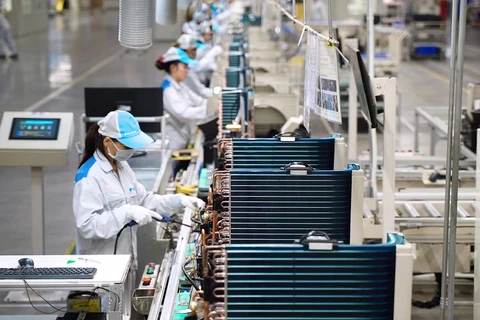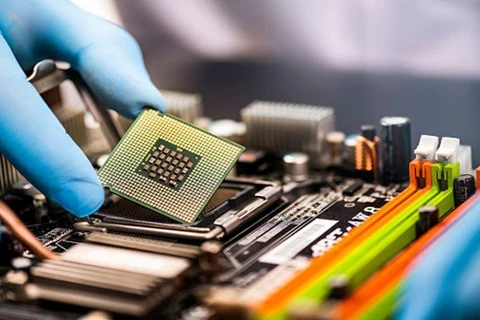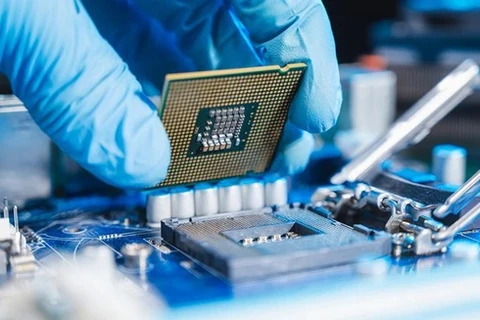Hanoi (VNA) – Vietnam wishes to develop its semiconductor industry, Prime Minister Pham Minh Chinh told Vice President and CEO of Amkor Technology Ji Rong-rip during a reception in Hanoi on October 12.
PM Chinh said Vietnam is building a development strategy and a human resources development plan, along with appropriate regulations, policies and mechanisms, to attract the world’s leading semiconductor manufacturers and designers to the country. This initiative aims to promote collaboration with the Vietnamese firms, creating conditions to improve their capability and gradually join the semiconductor industry value chain.
Vietnam will step up the training of high-quality workforce in semiconductor industry, with the goal of training 50,000 workers by 2030, he said, adding that Vietnam also advocates building a national semiconductor ecosystem with the participation of various stakeholders, including the Government, businesses, support organisations, universities, research institutes, and financial institutions.
The PM suggested that based on mutually beneficial interests and risk sharing, Amkor continue helping Vietnam develop semiconductor industry, especially in building mechanisms and policies, technology transfer, human resources training, governance capacity improvement, infrastructure and training facility building, R&D, design and testing, while also strengthening cooperation with Vietnam National Innovation Centre (NIC).
The group was also urged to expand its investment earlier than schedule, increase the rate of locally-made items, and make it easier for Vietnamese firms to explore collaboration opportunities and join its global production chain.
He assigned the Bac Ninh provincial People's Committee to work closely with ministries and agencies to promptly resolve any feedback and proposals from the group, ensuring the best conditions for its operations in Vietnam.
Ji, for his part, affirmed that Amkor will further contribute to Vietnam’s development and shape its semiconductor ecosystem in line with the suggestions provided by the PM.
He said Amkor wishes to employ highly skilled engineers and workers in Vietnam while also mobilising senior engineers and experts from its other facilities worldwide.
He also promised to continue attracting other investors to Vietnam and adding the country into its global network.
Established in 1968 and headquartered in the US, Amkor Technology is a pioneering semiconductor company that operates in both the US and the Republic of Korea (RoK). It was the first company to produce semiconductor products and brought success and growth to the RoK in this field. Recently, Amkor has inaugurated its new facility in Vietnam’s northern province of Bac Ninh./.

FDI continues to flow into Vietnam’s semiconductor industry
Despite daunting challenges in the trade sector across the globe, Vietnam has been persistent in its goal of luring high-quality foreign direct investment (FDI), with the semiconductor industry expected to breath fresh air into the nation’s economy.






















